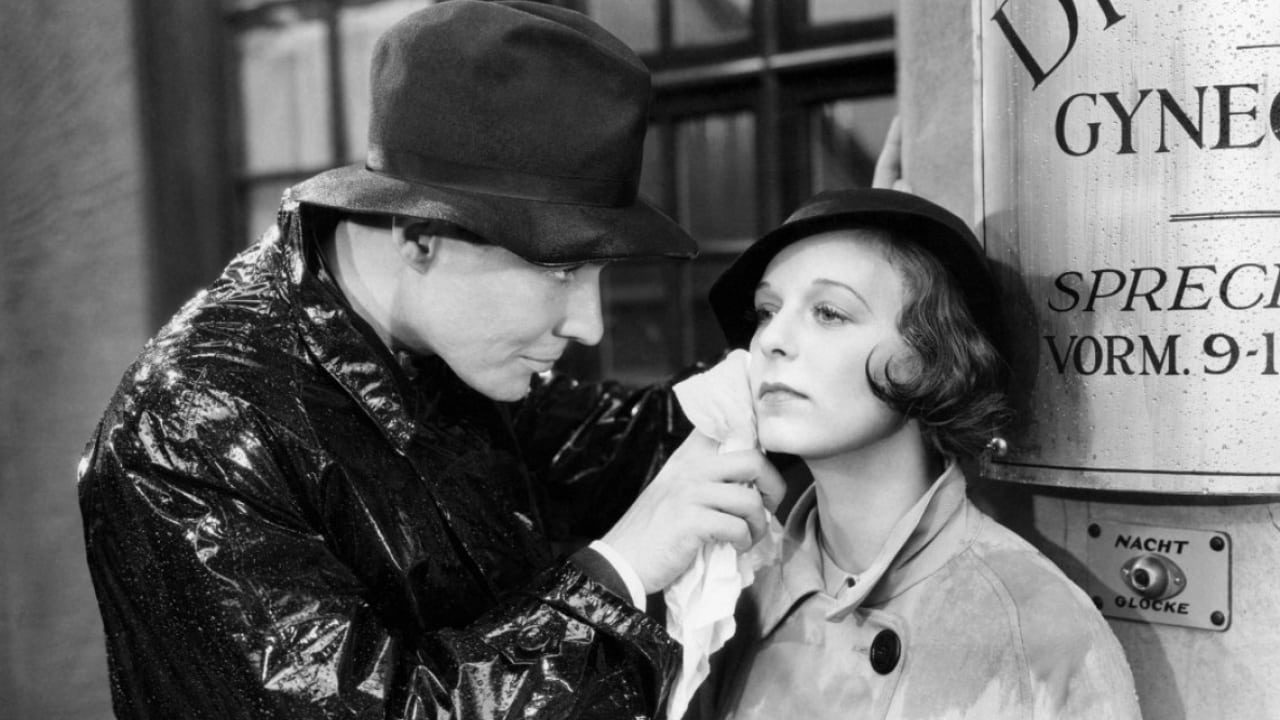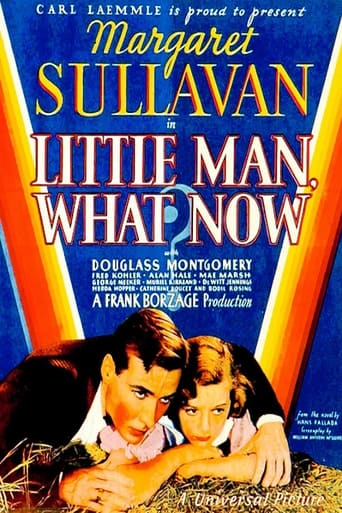

Full of Borgaze's trademark swoony romanticism mixed with a touch of pre-code decadence. This tale of a struggling young couple also boasts Margaret Sullavan's enchanting sensitive performance, she seems to carry a gossamer glow with her where ever she goes. Alan Hale also adds much to the film as a sprightly good-hearted charlatan but what drags it down almost fatally is Douglass Montgomery in the male lead. To put it plainly, he stinks. He's a stiff blank slate that stops the film dead in its tracks whenever he's the focal point of the scene. You're left to wonder what a more effective actor such as Jimmy Stewart or Cary Grant could have made of the part and how much better the movie would have been because of their casting.
... View MoreMany of the Hollywood moguls were sentimental about their European backgrounds and Carl Laemmle Jnr, whose father had emigrated from Germany and founded Universal Studios, thought "Little Man, What Now?" would make (with Frank Borzage in the director's chair) a topical but romantic drama. The book, by Hans Fallada, had already been turned into a German movie. Margaret Sullivan and Douglass Montgomery were to be the stars. Opinionated, stage trained Sullivan had a very low opinion of Hollywood and her movies in general but this was a film she always liked. Apparently there was not much rapport between her and Montgomery but fortunately it didn't show on the screen. "Little Man, What Now" had a lot in common with D.W. Griffith's "Isn't Life Wonderful" (1924) as it attempted to show young Germans coping with the depression caused by World War 1.Johannes (Douglass Montgomery) has a problem - he is employed by Emil Kleinholtz (DeWitt Jennings) who only employs single men so his plain daughter Marie (Muriel Kirkland) can find a husband. But Johannes is married already to the luminous Lammchen (Margaret Sullivan) and soon to be a father, so he must keep it a secret. Eventually he is found out and so begins the desolate search for a job. There is a gorgeous scene where Lammchen goes to the amusement park and when Johannes finds her on the merry go round she confesses that she has been too scared to go home - because she eat all their tea (salmon) on the way home.Meanwhile Lammchen has written to Johannes' stepmother and they soon find themselves living with her in Berlin. It is not the wonderful opportunity they had hoped for - she charges them exorbitant rent, the job she promised is not forthcoming and Lammchen finds herself having to fend off Holger Jackman's playful advances. Because he is played by Alan Hale, you know that underneath he is just a good hearted scoundrel and they find, in him, one of their few friends in the big city. Johannes finds a job in a department store, but once again his employment is in jeopardy. An uppity salesman (Monroe Owsley, in the type of role he played so well) sees an advertisement in the paper - "Discreet Evenings - Ladies Supplied" and as it is Johannes' address, he makes a snide remark about Lammchen. Johannes explodes as he realizes it is his stepmother!!! An afternoon with an egotistical actor (Alan Mowbray) who has come to the store not to buy but to "do research for a role" is the last straw and Johannes quits. Lammchen finds cheaper lodgings but for Johannes it is the start of a deep depression and months of joblessness, until the chance meeting of a good friend and the birth of their son shows him that life is there to be lived.I though Douglass Montgomery was absolutely brilliant in the role. He bought so much sensitivity and pathos to his role of the life discouraged Johannes who has only the unwavering love of Lammchen to pull him through. It seems the love of a good woman can make you do anything. Douglass Montgomery's career was far more patchy than Sullivans. It seemed for every excellent role he played ("Waterloo Bridge" (1931), "Little Women" (1933)) he was then cast in some lack lustre parts ("Music in the Air" (1934), "Lady Tubbs" (1935)). Even though his movie career petered out - he never stopped acting and had a fulfilling career.Highly, Highly Recommended.
... View MorePeace and tolerance are the hero's favorite words."Little man what now" was the first part of the trilogy which encompassed "three comrades" and would culminate in "the mortal storm" .The three movies featured the same star (Margaret Sullavan) and depicted life in Germany before WW2."Little man" -although Hitler came to power in January 1933- ,like "Three comrades" ,remains vague as far politics are concerned.But we feel while the heroes pace up up and down the street that there's something in the air (the first pictures).In "three comrades" ,the ending in the graveyard tells us that "they" are in town.And "the mortal storm" connects all the links and is the absolute masterpiece Borzage always threatened to make."Little man" is an overwhelming movie.Lammchen and Hans believe in love ,tolerance and peace and the world they live in is harshness ,selfishness, corruption and contempt.Hans's longing for human warmth is harrowing in the scene with the nurse.With an exception, when Hans is looking for a job,he meets people who enjoy humiliating and demeaning their fellow men."Little man" is full of strong scenes : the stroll in the country where the outside world (the hateful Kleinholz) will not leave the heroes alone; the actor who wants to play the part of a guy who "lives on the wrong side of the town" but who does not show any compassion when he meets one of those guys.Margaret Sullavan on the carousel,confessing she ate all the salmon she bought; on a bench in the park feeding the pigeons .Both Hans and Lammchen display the same naiveté : she really did know that near the pigeons ,there was a man and his wife who were starving.Hans did not know either that his stepmother's parties were very bad things.When the movie ends,there's another little man who,says Lammchen, will be by your side and help you cope with your struggle .Watching "little man" (or any of Borzage's movies) helps you be a better human being.
... View MoreOne of the most heartbreaking, swoon-inducing film experiences I've ever had is 1934's "Little Man, What Now?"It's about a young couple, with a child, struggling against poverty and a steady stream of bad luck in early 1930's Germany. It's an American film, but at times it almost plays like a piece of European cinema. The atmosphere is thick and the story isn't afraid to drift into areas that are a bit dark (and daring in a pre-code sense). It has a sentimental streak for sure, but the sentiment is never turned on at the expense of intelligence.Another stand out quality of the film is it's almost painfully gorgeous cinematography. The world of the film is like a dream or like something from a storybook. Sunlight shines against water and trees and grass with a pristine silvery glow. Faces are shown in the most lovely light. Margaret Sullavan, especially, is shot in a way that practically makes you fall in love with her.This is a true jewel of obscure 1930's cinema, rarely shown and, as of this writing, not available on any home video format. See it the first chance you get. It is a must for the classic movie enthusiast who feels like they've seen everything.
... View More